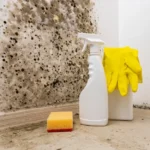Air Purifier or Humidifier: Which One Should You Use?
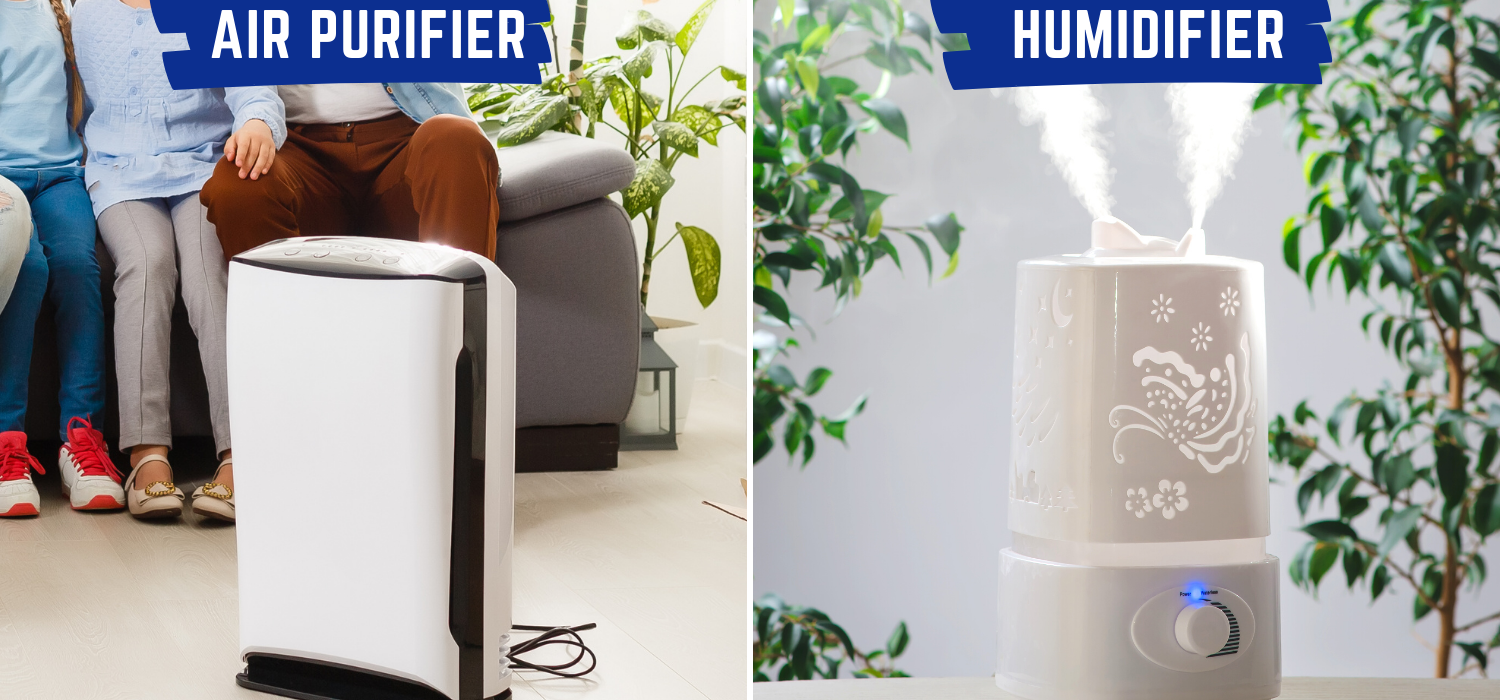
Many people wonder whether they should use an air purifier or humidifier in their homes to improve indoor air quality. Both devices have unique benefits and drawbacks, making understanding how they function and which one is better suited for your needs is essential.
This blog post will explore the differences between air purifiers and humidifiers, their advantages and disadvantages, and how to decide which one is right for you. Take a look!
 Air Purifier or Humidifier: Understanding the Differences
Air Purifier or Humidifier: Understanding the Differences
Before diving into the benefits and drawbacks of each device, it is crucial to understand the primary differences between air purifiers and humidifiers.
An air purifier is a device that removes contaminants from the air, such as dust, pollen, pet dander, mold spores, and bacteria. They work by drawing in air, passing it through a series of filters, and releasing clean air into the room. Air purifiers can help improve indoor air quality and alleviate allergy symptoms, asthma, and other respiratory issues.
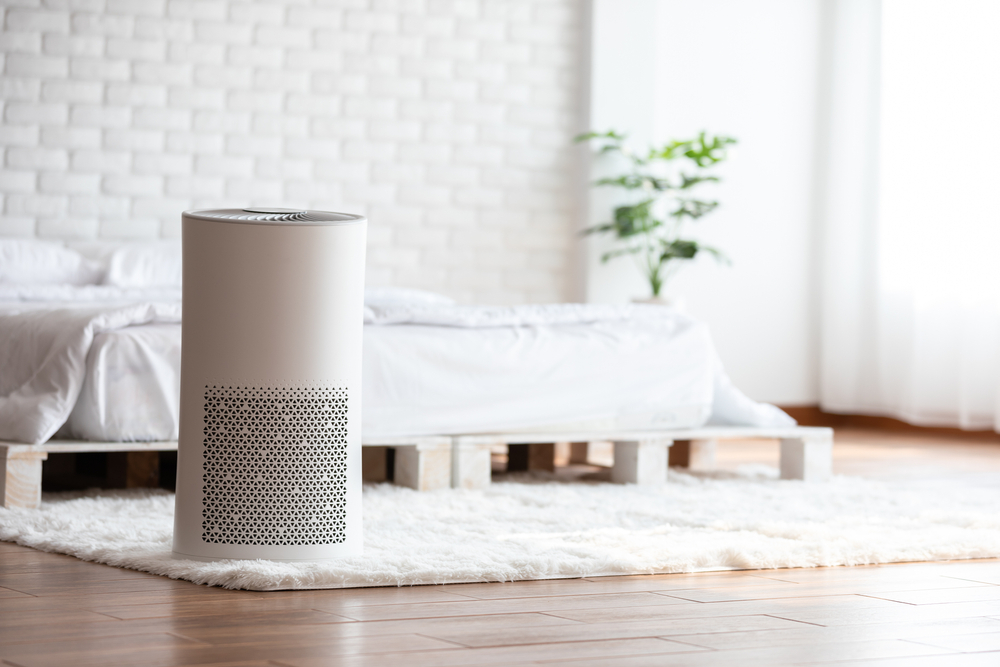
On the other hand, a humidifier is a device that adds moisture to the air, increasing the humidity levels in a room. It works by releasing water vapor or mist into the air, which can help alleviate dry skin, chapped lips, and other issues caused by dry indoor air. Humidifiers can also help to reduce the spread of airborne viruses, as they thrive in low-humidity environments.

Air Purifier or Humidifier: Advantages and Disadvantages
Both air purifiers and humidifiers offer unique benefits, but they also have some drawbacks. Let’s take a closer look at the advantages and disadvantages of each device.
Air Purifier Advantages
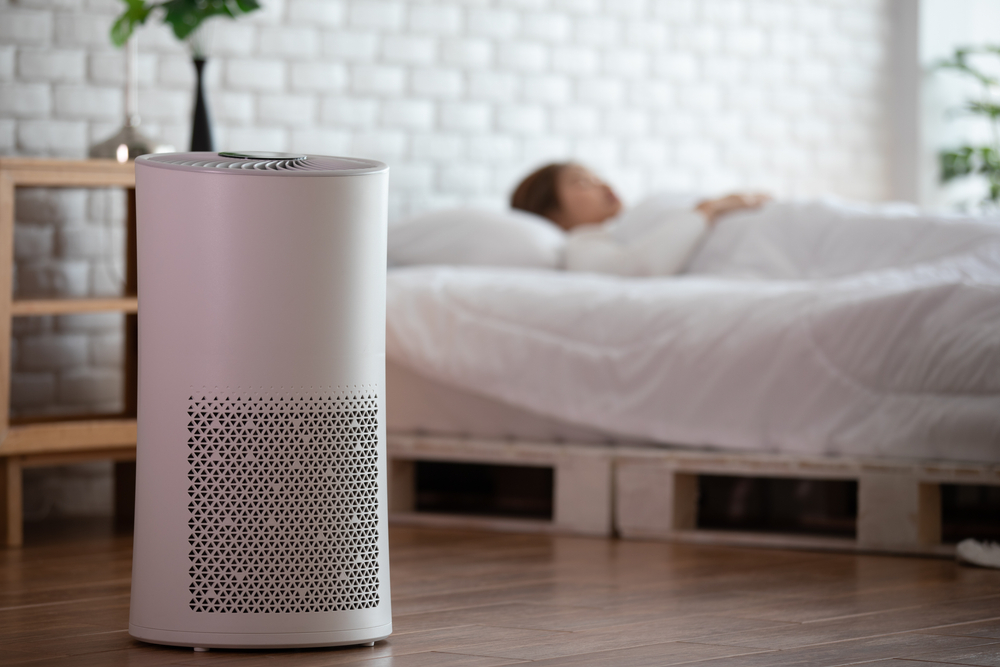
- Improved Air Quality: Air purifiers can significantly improve indoor air quality by removing dust, pollen, pet dander, and mold spores.
- Reduced Allergy Symptoms: Air purifiers can help alleviate allergy symptoms and improve respiratory health by eliminating allergens.
- Protection Against Mold: Air purifiers with HEPA filters can effectively remove mold spores from the air, preventing mold growth in your home. According to the EPA, HEPA filters can remove at least 99.97% of airborne particles with a size of 0.3 microns (µm).
- Alleviate Asthma Attacks Triggers: According to Yonsei Medical Journal and the National Library of Medicine, air purifiers can positively affect asthma patients’ health by filtering fine dust and microbes from indoor air.
- Fewer Odors: An air purifier can reduce noticeable odors, such as lingering cooking smells. If your home lacks proper ventilation, an air purifier with an activated carbon filter can help minimize or completely remove these smells that could otherwise be annoying.
- Eliminating VOCs: Air purifiers can eliminate harmful chemicals and volatile organic compounds (VOCs) produced by various equipment and materials, including carbon dioxide and nitrogen dioxide.
Air Purifier Disadvantages
- Noise: Some air purifiers can be pretty noisy, which may concern light sleepers or those sensitive to noise.
- Filter Replacement: Air purifiers require regular filter replacements, which can add to the overall cost of the device.
- Limited Moisture Control: Air purifiers do not address issues related to low humidity levels in your home.
Humidifier Advantages
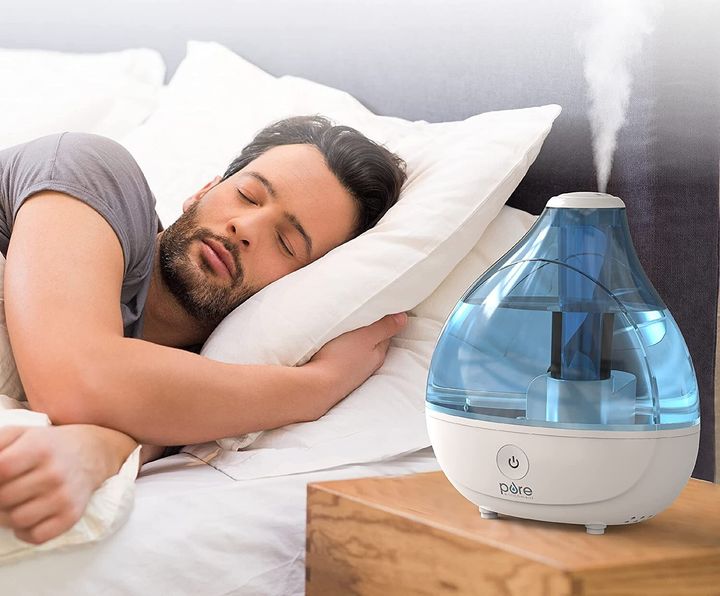
- Increased Comfort: By adding moisture to the air, humidifiers can alleviate dry skin, chapped lips, and other issues caused by dry indoor air.
- Improved Respiratory Health: Humidifiers can help to relieve congestion and alleviate symptoms of colds and allergies by providing moist air for easier breathing.
- Reduced Airborne Virus Spread: Humidifiers can help to reduce the spread of airborne viruses by maintaining optimal humidity levels.
- Overall Air Quality Improvement: Moist air can be especially beneficial for individuals with respiratory illnesses or allergies, as dry air can make breathing more difficult and prolong the duration of symptoms. By adding moisture to the air, a humidifier can help reduce contaminants’ concentration and improve the indoor environment’s overall health.
Humidifier Disadvantages
- Mold and Bacteria Growth: If not correctly maintained, humidifiers can harbor mold and bacteria growth, leading to potential health concerns.
- Excess Humidity: Over-humidification can increase mold growth and other moisture-related issues in your home.
- Regular Maintenance: Humidifiers require regular cleaning and maintenance to prevent mold and bacteria growth.
Air Purifier or Humidifier: Choosing the Right One for Your Home
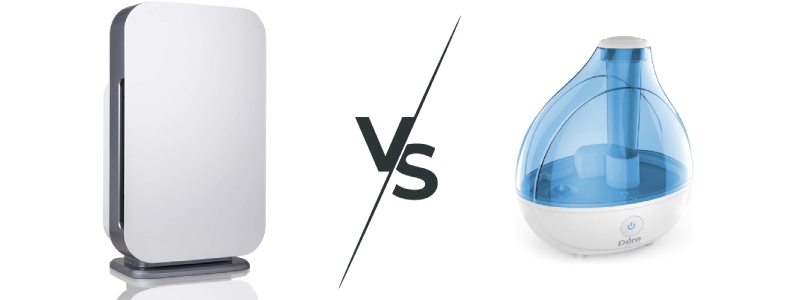
When deciding between an air purifier or a humidifier, it is essential to consider your specific needs and concerns. Here are some factors to consider when choosing the right device for your home.
Use an air purifier if:
- You or someone in your household suffers from allergies, asthma, or other respiratory issues that worsen in contaminated air.
- Your primary concern is improving the overall air quality in your home. Air purifiers can effectively remove pollutants and contaminants, such as dust, mold spores, and pet dander, that can negatively impact indoor air quality.
- You live in a humid environment or have experienced mold issues in your home. An air purifier with a HEPA filter can help remove mold spores from the air and prevent further mold growth.
- Household odors from cooking, smoke, pets, or mold are becoming problematic.
- You want to lower the levels of VOCs present in your home’s air.
Use a humidifier if:
- You live in a region with a dry climate.
- You struggle with dry skin, chapped lips, or other issues related to low humidity levels. Humidifiers add moisture to the air, helping to alleviate discomfort caused by dry indoor air and promoting a more comfortable living environment.
- During cold and flu season, you want to maintain optimal humidity levels to reduce the spread of airborne viruses.
- Dry air lead to sinus irritation and nosebleeds, making it uncomfortable to breathe and sleep.
- Snoring becomes a severe problem because of the dry air.
- The humidity levels at home are too low, driving health issues.
 Air Purifier or Humidifier: Can You Use Both?
Air Purifier or Humidifier: Can You Use Both?
Using an air purifier and a humidifier in your home may be beneficial. Both devices can help improve indoor air quality, maintain optimal humidity levels, and promote a healthier living environment.
However, it is essential to properly maintain both devices to prevent mold and bacteria growth and ensure their effectiveness.
So, Air Purifier or Humidifier?
Ultimately, deciding between an air purifier or humidifier depends on your needs, concerns, and living environment. Air purifiers are an excellent choice for those with allergies, respiratory issues, or concerns about indoor air quality. In contrast, humidifiers can relieve dry indoor air and help reduce the spread of airborne viruses.
By understanding the differences between air purifiers and humidifiers and their respective advantages and disadvantages, you can make an informed decision about which device is best suited for your home.
FAQs: Air Purifier or Humidifier?
- What is the main difference between an air purifier and a humidifier?
An air purifier removes contaminants from the air, while a humidifier adds moisture to it. - When should I use an air purifier?
An air purifier is beneficial if you suffer from allergies, asthma, have pets, or are concerned about airborne pollutants like dust, pollen, and mold. - When should I use a humidifier?
A humidifier is useful in dry environments to alleviate symptoms like dry skin, chapped lips, sinus congestion, and dry throats, especially during colder months. - Can an air purifier help with allergies?
Yes, air purifiers can significantly reduce allergy symptoms by filtering out common allergens such as pollen, dust mites, and pet dander from the air. - Do humidifiers help with respiratory issues?
Yes, by adding moisture to the air, humidifiers can help soothe irritated nasal passages and throats, making it easier to breathe and potentially reducing symptoms of colds and flu. - What are the disadvantages of an air purifier?
Air purifiers can be noisy, and their filters require regular cleaning or replacement, which incurs ongoing costs. - What are the disadvantages of a humidifier?
Humidifiers require consistent cleaning and maintenance to prevent the growth of mold and bacteria, which can be dispersed into the air if neglected. - Can I use both an air purifier and a humidifier at the same time?
Yes, you can use both devices simultaneously in the same room. Many people use an air purifier to clean the air and a humidifier to control humidity levels independently. - How do I choose between an air purifier and a humidifier for my home?
The choice depends on your specific needs: choose an air purifier for air quality concerns (allergies, pollution) and a humidifier for dryness-related issues (dry skin, respiratory discomfort). - Are there combination units that do both?
While less common, some devices offer both air purification and humidification functions in a single unit. It’s important to research their effectiveness for both roles.






